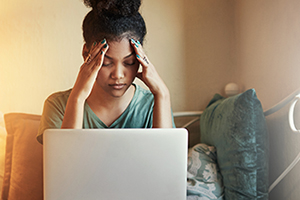
Dealing with anxiety can be daunting.
There are methods to help and assist
with your anxiety.
Photo: iStock
No one is immune to anxiety, and the current challenging academic times are no exception. With the Academic Reboot Pack 2.0, the University of the Free State (UFS) addresses these adversities.
Dealing with anxiety differently
People react to anxiety differently. For some it’s like a dark tunnel with no light at the end, while it keeps others on their toes. Regardless of how you deal with it, it is still an unpleasant emotion.
“For me, it (anxiety) makes me more determined to do well, so that I can start the next part of my life as soon as possible,” said Greg Butters, a postgraduate BCom Accounting student at the UFS.
Ways to manage and overcome
There are different ways to manage anxiety. Here are some methods that can assist you in dealing with it:
Keep the following in mind when you are feeling anxious:
- Realise that anxiety is an amplified response to stress.
- Face your anxiety head-on.
- Do not add to your anxiety by thinking about what "might" happen. If you find yourself asking "What if?" tell yourself "So what!"
Where to get the right help
It is also important to know that there is help. When you feel that anxiety is affecting you negatively, pick up a phone and call one of the following departments:
- Medical Practice +27 51 401 2603
- Qwaqwa Campus Clinic +27 58 718 5210
- Sports and Exercise Medicine Clinic +27 51 401 2530
- First Aid +27 51 401 3325
- Emergencies (After hours) - ER 24 0800 051 051 or 084 124
You can also contact the South African Depression and Anxiety Group (SADAG) 24-hour helpline. SADAG has various helplines that can help you deal with anxiety and depression.
Get your copy of the Academic Reboot Pack 2.0 on Blackboardunder announcements or click here to download it.
Also see the first Academic Reboot Pack.
If students have any question or queries regarding the Academic Reboot Pack, they can send an email to: advising@ufs.ac.za.